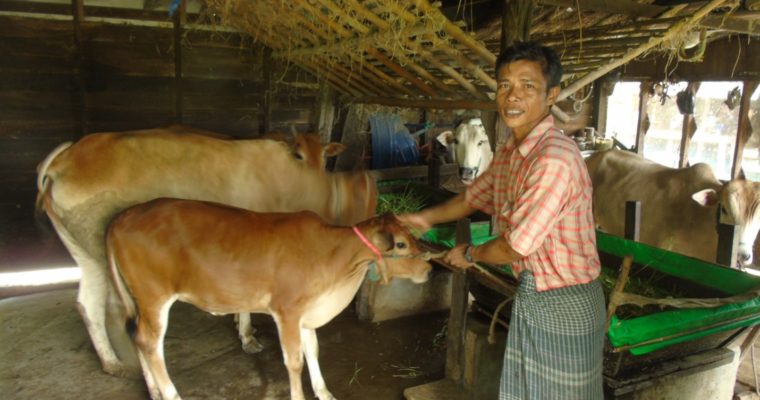Yangon, Myanmar – Kyaw Lin Htay lives in Tha Byay Kone Village, Thanlyin Township, Yangon Region with his family. He enjoys farming and has a very good view of agriculture development. Htay wants to have a healthy environment, a happy family, and peaceful society. He loves nature thus, he wants to make sure that he does not poison the environment through unsustainable farming practices.
He is one of the mushroom farmers trained by Ye Htut, a young farmer and also a member of the Agriculture and Farmers’ Federation of Myanmar (AFFM). “I learned a lot of skills and knowledge from Ye Htut. I would like to express my highest gratitude to him and our organization AFFM and the other organizations and people who helped us,” he says.
Currently, mushroom cultivation is the main source of income of Htay’s family. They have 12 mushroom beds of 3×10 ft. long. They hope to make at least 900,000 Myanmar kyats (USD 530) out of their mushroom farm in two months.
He has been growing straw mushrooms since 2017. During his first time growing mushrooms, he saved MMK 800,000 (USD 560). The residues from growing mushrooms are used as a natural fertilizer in Htay’s farm.
Htay understands the benefits of diversity. He has chickens and ducks and is also breeding fish in a small pond near his house. His rice farm is better than his neighbor’s land because it does not have weeds thanks to the ducks that clean the weeds out.
The small pond on his farm is his family’s main source of water for daily uses, growing vegetables, and other crops during winter and summer. He also breeds fish in this pond.
In addition to this, Htay also has cows which are the main source of fertilizer for his farm. Cow manure is used not only in gardening but also in growing mushrooms. “Keeping cows is practical. Farm residues are fed to the cows and cow residues are used in the farm. They are benefiting each other,” he explains. He also gets milk from his cows which he sells for MMK 1000 (USD .70) per liter. Moreover, cows are useful for farm labor. Even if Htay uses a machine for plowing his land, he understands that animals are essential for farming.
“I do not make too much income from any of these but the income I make from all these combined is enough for my family,” he says. Even though he does not make much money, he is content that he is able to provide for his family without harming the environment. #
About MTCP2
The Medium-Term Cooperation Program Phase 2 (MTCP2), a five-year capacity building program supported by the International Fund for Agricultural Development (IFAD), the Swiss Agency for Development and Cooperation (SDC), and the European Union (EU) , has been implemented in 22 countries across three sub-regions—Southeast Asia (through the ASEAN Farmer Organization Support Program-AFOSP-MTCP2), South Asia, and the Pacific—engaging 86 national federations of farmers organizations with 1,628 sub-national farmers organizations (FOs) with a total membership of around 43.5 million small-scale women, men and young farmers. The funding support (12 million USD) served as a catalytic fund that allowed FOs to enhance their capacity to engage in policy dialogues and to be effective channels of economic services to farmers. The program has contributed to the formation of strong national platform of FOs with improved capacity to engage in constructive policy processes and mobilize resources from mainstream agricultural development programs like extension services, credit, and pre and post-harvest facilities. The program also helped in re-structuring farmers’ associations into community-based social enterprises or as commodity-based cooperatives as well as consolidating FOs into agricultural cooperative federations/union to strengthen the role of small-scale farmers within an inclusive and sustainable value-chain. The program is being implemented by the consortium Asian Farmers’ Association for Sustainable Rural Development (AFA) and La Via Campesina (LVC).




Comments are closed